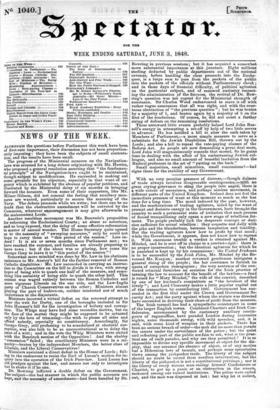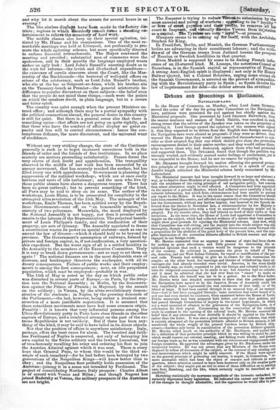With no very peculiar pressure of distress,—though dulness of trade
always involves disagreeable contingencies,--urith no great crying grievance to sting the people into anger, there is a wide extent of uneasiness, and perhaps aimless movement, in different parts of the United Kingdom. Ireland does not feel the immediate pressure of want at this moment so much as she has done for a long time. The mood induced by the past, however, and the machinations of trading agitators, aided by the want of prompt and decisive energy in the Government, have brought the country to such a permanent state of irritation that each process of forced tranquillizing only opens a new stage of rebellious fer- ment. The people probably lack the desperate courage or deci- sion sufficient for actual rebellion : they coquette and dolly with the pike and the blunderbuss, between temptation and timidity. But the trading agitators know how to profit by that mood; while the Government, it appears, does not know how to repress it. With enormous trouble a verdict is obtained against Mr. Mitchel, and he is sent off in chains to a convict-eepot : there is no proper insurrection ; but the identical agitation for which he is punished is kept up by his companions : the United Irishman is to be succeeded by the Irish Felon, Mr. Mitchel by the Re- verend Mr. Kenyon; another reverend gentleman instigates a general rising of the people ; the bar continues to furnish its quota of outspoken demagogues ; the very sentence of the con- victed criminal furnishes an occasion for the Irish practice of turning the law to account for the benefit of the lawless—a fund is raised for " Mary Mitchel," the wife of the convict, described by one of her husband's compatriots as " the loveliest of the lovely "; and Lord Cloncurry makes a little popular capital out of the transaction by contributing 1001. Government has suc- ceeded in the first trial under the Crown and Government Se- curity Act ; and the party against whom the statute was directed have succeeded in deriving their share of profit from the measure. The Irish turmoil has had a sympathetic counterpart in some of the larger English towns. Combined Chartists and Irish Con- federates, accompanied by the customary auxiliary contin- gents of ragamuffins, have paraded London during successive nights, some thousands strong, with wild speeches, and, it is said, with some kind of weapons in their pockets. There has been no serious breach of order—the mob did no more than parade the streets under the surveillance of the police ; but the quiet and reflecting part of the public are fain to ask, what is the prac- tical use of such parades, and why are they permitted ? It is so impossible to divine any specific movement or object for the dis- play, that one assumes the absence of object, or of any motive but a Hibernian love of tumult, and perhaps some speculative views among the pickpocket trade. The liberty of the subject should no doubt be sacred from needless intervention, but the liberty of the pickpocket is not a constitutional privilege ; nor is the liberty of every riotous man calling himself Confederate or Chartist, to get up a panic or an obstruction in the streets, reckoned among our valued institutions. The police were called out, and the mob was dispersed at last : but why let it collect,
and why let it march about the streets for several hours in an evening ? The like aimless displall have Mete made In thO factory die. tricts ; regions in which lisordeik Unlink fossils a standing elk* tertainment to relievlithetlitonotolly of bard work. The middle classes also keep up their special agitation, ini- tiated by Mr. Hume and his companions. One of the most re- markable meetings was held at Liverpool, not professedly to pro• mote the whole agitating scheme, but more specifically directed to enforce financial retrenchments. The Mayor convened the meeting and presided ; substantial men of commerce were the spokesmen, and in their mouths the language employed wears rather an ugly look : Lord John's Russell's sneering doubt as to the wish for reforms—the lavish and ill-checked expenditure—. the existence of servile sinecures about the Court, like the Mas- tership of the Buckhounds—the bestowal of well-paid offices on scions of the aristocracy, such as Lord John Russell's brother, who sits at the bar as Sergeant-at-Arms, while his brother sits on the Treasury-bench as Premier—the general aristocratic in- difference to popular discontent on these subjects—the belief even that the people do not mind these things,—such were the points on which the speakers dwelt, in plain language, but in a severe and bitter spirit.
The country was quiet enough when the present Ministers en- tered office ; and although there may be a partial sympathy with the political commotions abroad, the general desire in this country is still for quiet. But there is a general sense also that there is something amiss—that affairs are not going on quite rightly, and that those who have the conduct of affairs display no great ca- pacity and less will to control circumstances : hence the con- temptuous defiance, the mute discontent, and the universal want of confidence.



























